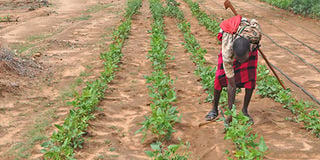Transition from cattle to crops pays off for Turkana group

James Naoi,member of Achukule farmers self-help group ,checking vegatables.PHOTO| LEOPOLD OBI|NMG
What you need to know:
- Lokichar in Turkana County is home to the country’s oil resources, with British firm Tullow carrying out exploration activities in the dusty and dry region.
- The expansive county is entirely arid and dominated by pastoralists, with most fruits and vegetables sold in the area sourced from neighbouring Trans Nzoia and Uasin Gishu counties.
Lokichar in Turkana County is home to the country’s oil resources, with British firm Tullow carrying out exploration activities in the dusty and dry region.
But despite the aridity, a group of farmers going by the name Achukule Agroforestry Group are working hard to earn from the soil.
On this day, they converge on their farm to prepare drip irrigation pipes ahead of planting.
Each of the more than 70 members of the group has a small plot carved from a five-acre farm, where they grow collard greens (sukuma wiki), pumpkin, watermelons, peas and traditional vegetables under drip irrigation.
The expansive county is entirely arid and dominated by pastoralists, with most fruits and vegetables sold in the area sourced from neighbouring Trans Nzoia and Uasin Gishu counties.
But poor road networks have not only made commodities costlier, but the farm produce arrives in the region withered.
Achukule farmers are keen on tapping into the huge market in the area.
Rael Akeno, a member of the group, explains that they started in 2011 with 40 people and were farming on two acres. The number has now grown to 75.
“Every member is allocated six rows where they grow vegetables for their household consumption and sale. We do farm preparation as a group, agree on what to plant – vegetables, tomatoes and watermelons and plant the same day to get the volumes. We sell our produce in Lokichar Town, less than a kilometre away,” explains Akeno, noting they have leased the land.
Since it is in the middle of shrubs and acacia trees and with the community comprising mainly pastoralists, the farm has been fenced off with chain-links to keep off intruding livestock.
It also has two solar-powered boreholes. Water from the boreholes is then pumped into two raised 10,000-litre tanks, from where it flows via gravity into drip lines to water the vegetables. The infrastructure was built for them by US African Development Foundation.
Once farm preparation is done, the farmers add animal manure to the soil, after which they test irrigation pipes before planting seeds just along the drip lines. They plant certified seeds.
James Naoi, 42, a member of the group and a former pastoralist, says he embraced crop farming after losing all his goats to prolonged drought a few years ago.
“I have six rows where I farm. On the first three I have grown African nightshade (managu) and cowpeas on the others,” he explains, adding he sells the vegetables in bunches of Sh20.
In a week, each member of the group takes home Sh2,000 from crop sales.
Since the area is hot and sandy, a lot of water is needed to sustain the crops. Yet, with the prevalent dry weather conditions, the water table falls lower making it hard for them to get water from the boreholes.
Joseph Ekiru, the chairman of the group, explains that members are regularly trained on new smart-faming technologies.
“Moving from nomadic life to crop farming isn't easy. We give them free membership but once they harvest and sell their produce, we take a small cut for monthly contribution,” he explains.
Alex Otieno, an agricultural engineer, says that a lot of resources should be allocated to irrigation in dry areas to enhance food production.
“Other than boreholes, there should be initiatives to harvest rainwater and surface runoff for the purposes of irrigation,” he says.
The expert says regions such as Turkana, which experience very high temperatures, need automated greenhouses.
“Automated greenhouses have humidifiers, which enable regulation of the temperatures inside the greenhouse,” Otieno adds.





